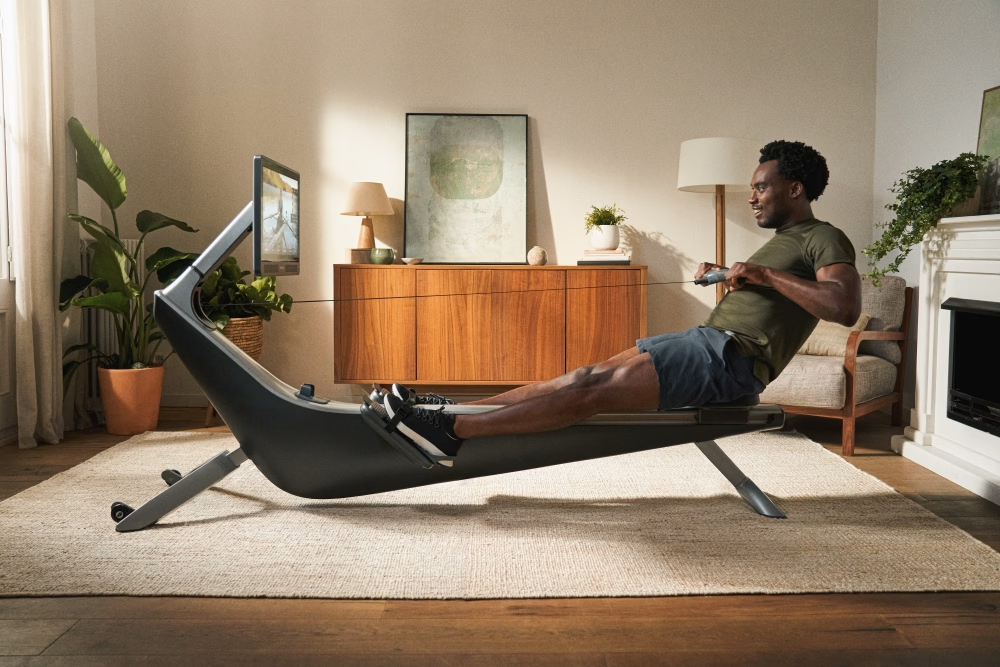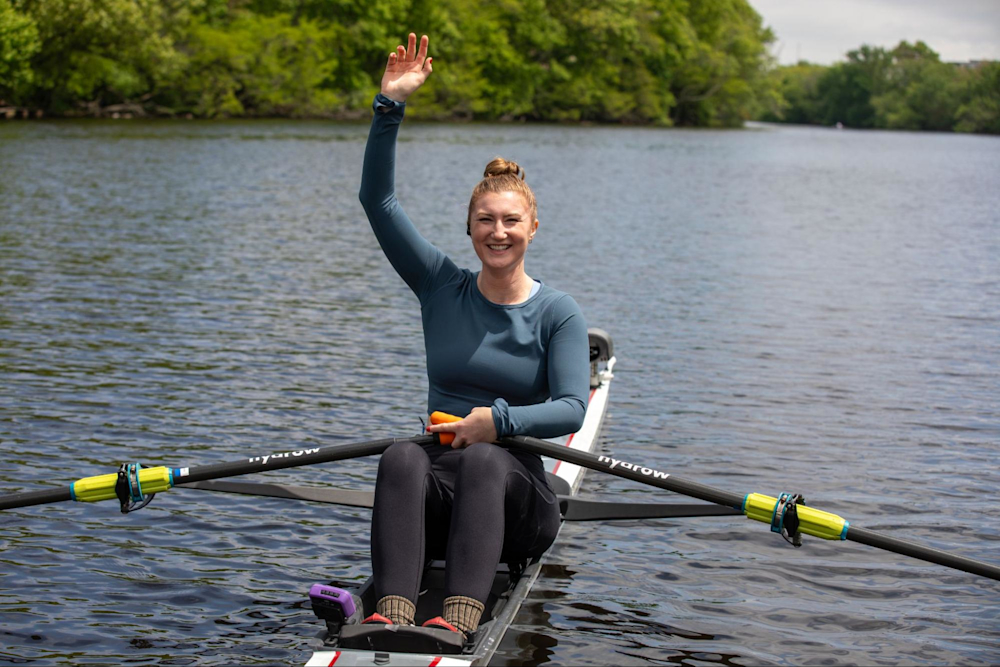Beginner Rowing Workouts: What to Expect (and 7 Workouts to Try!)

Getting on a rowing machine for the first time can be a little intimidating. If you’re brand-new to rowing, you may not be familiar with how to structure a workout, row properly, or pace yourself.
But nerves aside, rowing is actually a fantastic workout for beginners: You can ease yourself into the sport with beginner rowing workouts that are specifically tailored to new rowers. These routines can help you learn rowing technique, build endurance and stamina, and grow more comfortable during your workout. Plus, rowing is lower-impact and gentler on your body than other cardio workouts that aren’t always as accessible for those just starting out, such as running.
Not sure where to begin? Jump into this guide to rowing machine workouts for beginners, which will cover:
Let’s dive in!
What to expect from a beginner rowing workout
A beginner rowing workout doesn’t have to be long: Even just 10 to 15 minutes (or however long you can comfortably maintain a steady pace) is a great place to start. At Hydrow, most of our workouts are only 20 minutes, and we have loads of beginner-friendly options that are even shorter. Start with a few minutes of rowing and see how you feel; it’s absolutely OK to build up to a 20-minute workout over time.
During a rowing workout, you’ll hear our Athletes refer to your stroke rate or rhythm, which is measured and displayed on Hydrow rowers in strokes per minute (SPM). This is similar to how your speed is displayed on a treadmill. Beginners typically start out comfortably rowing about 18 to 26 SPM. Maintaining a steady SPM allows you to practice proper rowing form and technique.
There are four parts to the perfect row:
The Finish: This is where you end (and start!) each stroke. Your legs will be straight, your shoulders will be just behind your hips, your core will be engaged, and your arms will be drawn into your chest.
The Recovery: Extend your arms, bringing the rower handle back toward the front of the machine. Your knees will also rise as you move toward the front of the rower.
The Catch: Hinge at the hips and rock your upper body over your hips while keeping your back straight and your core engaged. Your chest should be up and your arms should stay extended as your knees bend deeper.
The Drive: Intentionally push through your feet until your legs are straight (but don’t fully lock your knees). Lean back and pull the handle toward your chest.
Need a little more guidance? Hydrow offers Personal Coaching YouTube videos and Personal Coaching live sessions so you can get expert advice on perfecting your form.
You’ll also hear our Athletes refer to the intensity of your workout. At Hydrow, we equate intensity to walking and running paces. Our Athletes will let you know if your effort should feel like a walk, a jog, a run, a sprint, or the maximum intensity you can muster.
Before any beginner rowing workout, consider doing a few minutes of mobility work to get your joints and muscles prepped for the challenge ahead. You can also spend the first few minutes of any rowing workout easing into your desired SPM. Afterward, cool down with some mobility and stretching to keep your now-tired muscles flexible and pliable for your next session.
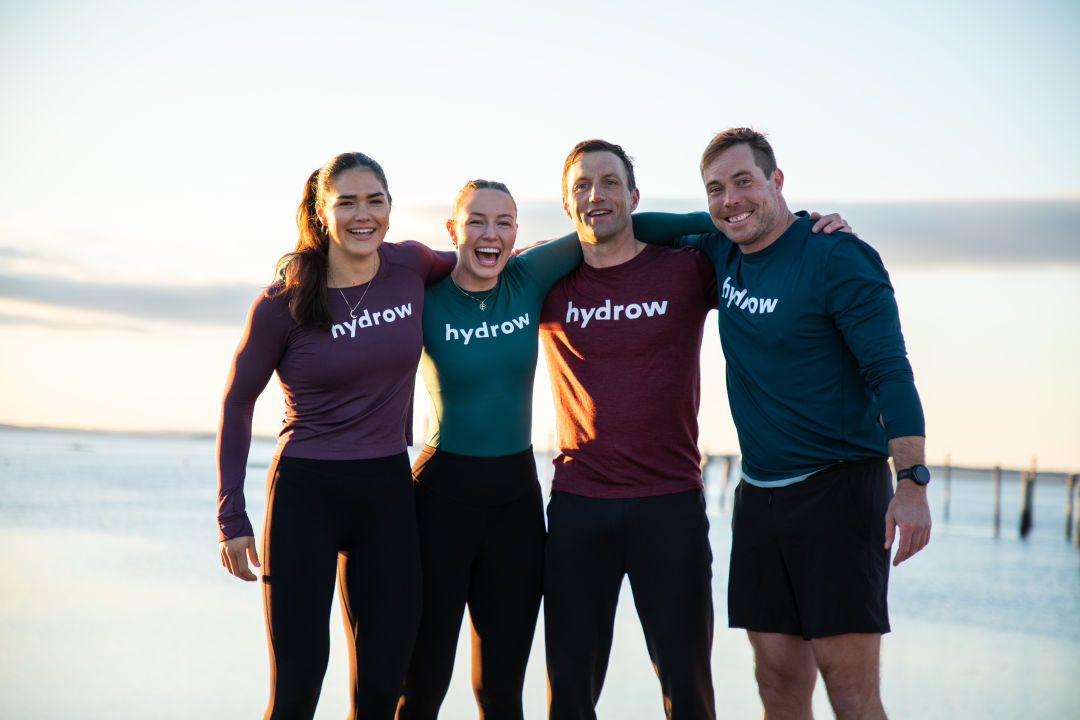
Explore Hydrow's library of 5,000+ rowing, circuit training, yoga, Pilates, and mobility workouts.
The benefits of beginner rowing workouts
A beginner workout on a rowing machine shouldn’t push you too hard at first: You should have the time and space to get familiar with the equipment before ramping up your intensity.
Guided rowing workouts for beginners also walk you through the metrics you’ll be using and how to keep track of your progress.
Initially, you may be comfortable at that lower range of SPM, and you may not be able to row for more than a few minutes at a time. Gradually, you’ll build endurance and stamina and you’ll be able to row faster and longer.
As you progress, you’ll get even more benefits from rowing, including building full-body strength, burning calories and fat, improving your cardiovascular fitness, increasing your flexibility and mobility, and improving your mental health.
The more you put into a rowing workout, the more you’ll get out of it, but listen to your body and don’t go too hard too fast. That’s a recipe for injury and burnout! When you’re just starting out, your primary goal should be to get familiar with the workout. Over time, you can work toward building strength, endurance, and cardio fitness.
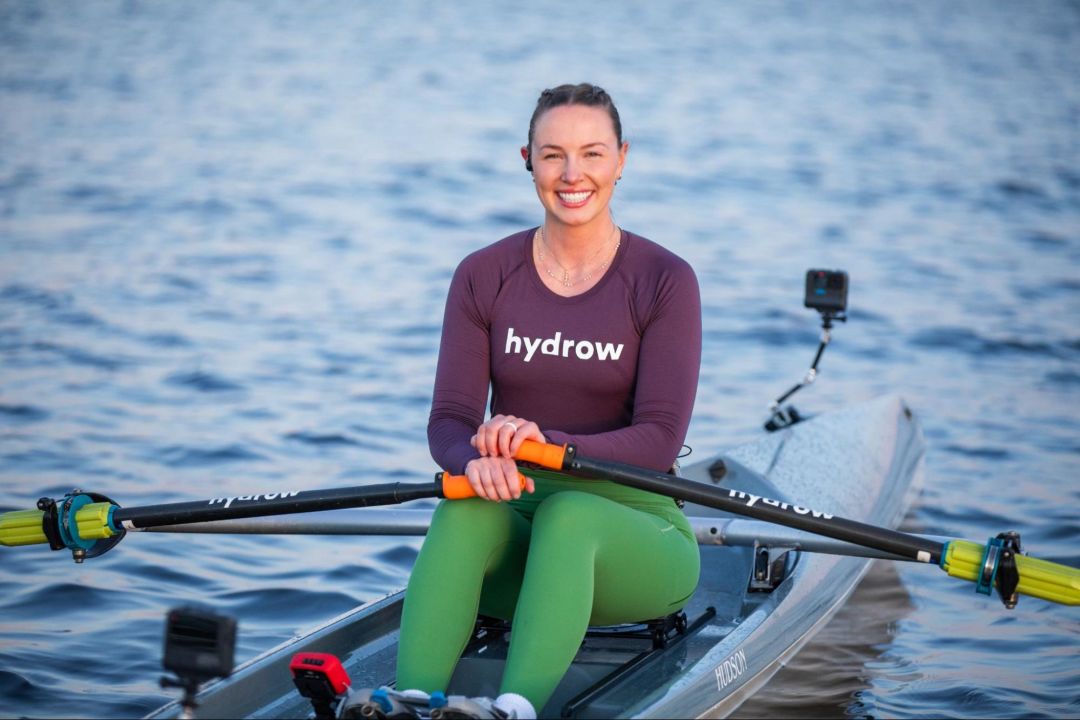
Did You Know?
Over 90% of Hydrow members are still active one year later.
Common rowing workout mistakes to avoid
It’s normal to find some aspects of rowing a little bit challenging at first. Some common stumbling blocks for beginners include:
Pulling with your arms instead of using your legs
Slouching in your seat
Pulling with your arms too early
Bending your knees too early
Rushing through the rowing stroke
Not taking enough rest days between workouts
These rowing mistakes can all make you more likely to injure yourself early on in your introduction to rowing, which can stall your progress toward your fitness goals. Rowing injuries are typically related to overuse, according to a study in Sports Health. Make sure you’re practicing good rowing form and giving yourself enough time to rest and recover between workouts to avoid getting hurt.
How to stay motivated when starting to row
When you’re new to rowing, it’s tempting to give it your all right off the bat. We applaud your enthusiasm! But biting off more than you can chew is bound to backfire. Instead, set achievable, measurable milestones so you can track your progress over time. That way, you won’t get discouraged by a goal that feels too lofty.
You can also stay motivated by mixing up your weekly routine: In addition to your beginner rowing workouts, try including some running, swimming, hiking, cycling, or other forms of cardio you enjoy. This will help prevent any one type of exercise from feeling stale over time. Add some strength training, too, for even more engaging variety (and big benefits to your muscles!). You can even try different types of rowing workouts so you don’t get stuck in a rut.
7 types of beginner rowing workouts to try
As you get started with crafting your rowing routine, there are different types of beginner rowing workouts you’ll encounter, including:
Basic rows or steady-state rows
Interval training
Pyramid rows
Technique-focused rows
Distance rows
Mixed cardio or circuit workouts
Endurance rows
Here’s what you need to know about each one:
1. Basic rows or steady-state rows
In a basic or steady-state row, you’ll hold a consistent pace around 18 to 22 SPM for a certain amount of time, such as 10 or 20 minutes. This allows you to work on your form with each stroke and start building your base of cardiovascular fitness. This should feel like the intensity of a brisk walk to an easy jog.
Time in Minutes | SPM | Intensity |
10-20 | 20 | Walk or jog |
2. Interval training
This rowing workout format closely resembles a high-intensity interval training (HIIT) workout. It helps beginners test their ability to row at faster speeds, and it helps you start building strength and power. Including a brief warmup period, these rowing workouts can typically take about 10 to 30 minutes.
Time in Minutes | SPM | Intensity |
0 – 1 | 18 | Walk |
1 – 2 | 22 | Jog |
2 – 2:30 | 26 | Sprint |
2:30 – 3 | 18 | Walk |
3 – 3:30 | 26 | Sprint |
3:30 – 4 | 18 | Walk |
4 – 4:30 | 26 | Sprint |
4:30 – 5 | 18 | Walk |
5 – 5:30 | 26 | Sprint |
5:30 – 6 | 18 | Walk |
6 – 6:30 | 26 | Sprint |
6:30 – 7 | 18 | Walk |
7 – 7:30 | 26 | Sprint |
7:30 – 8 | 18 | Walk |
8 – 8:30 | 26 | Sprint |
8:30 – 10 | 18 | Walk |
3. Pyramid rows
Pyramid rows, as the name implies, go up and then back down in rhythm. They’ll help you start to push yourself a little more while keeping your mind occupied because of the creative structure of the routine.
Time in Minutes | SPM | Intensity |
0 – 1 | 18 | Walk |
1 – 2 | 20 | Jog |
2 – 3 | 22 | Jog to run |
3 – 4 | 24 | Run |
4 – 5 | 26 | Sprint |
5 – 6 | 28 | Max |
6 – 7 | 26 | Sprint |
7 – 8 | 24 | Run |
8 – 9 | 22 | Jog to run |
9 – 10 | 20 | Jog |
4. Technique-focused row
Rowing is very technical, and Hydrow offers themed routines geared at perfecting specific aspects of the rowing technique. You might try one educating you on how to use your legs, where to pull the handle in, or the sequence of the rowing stroke. The Athletes motivating you will typically instruct you not to worry too much about your pace or intensity but instead to really focus on getting better at the technique in question.
Time | SPM | Intensity |
0 – 10 | 18 to 22 | Walk to jog |
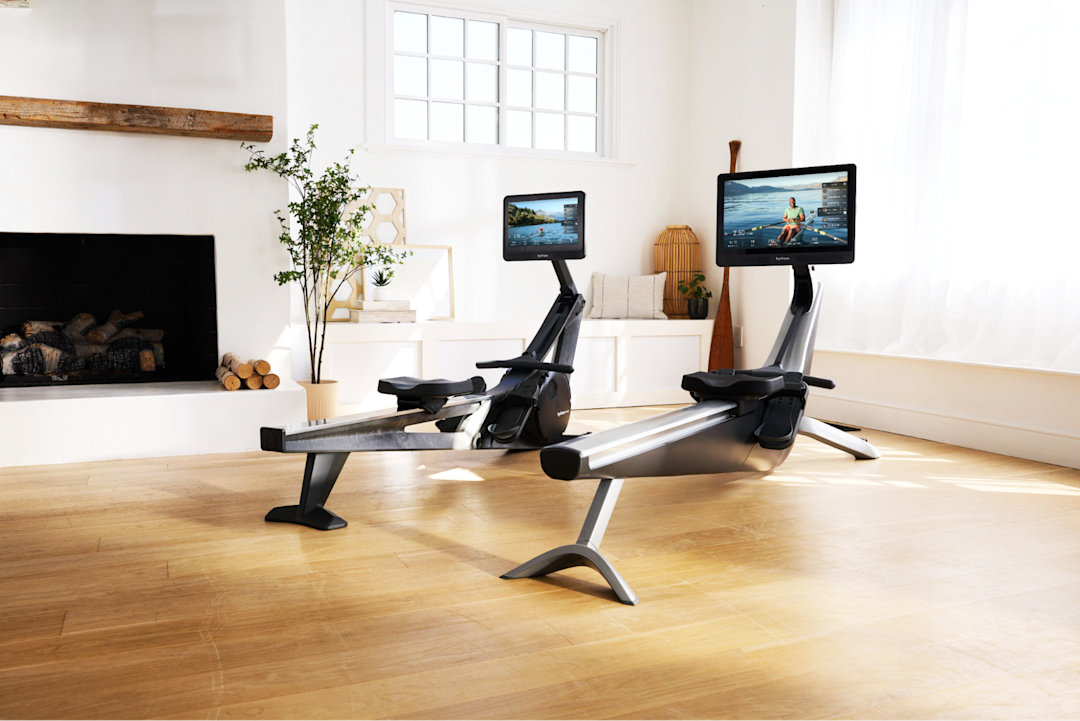
Considering a Hydrow rowing machine? We tackle all your burning questions in our FAQ guide.
5. Distance challenge
Distance workouts will help you get in the spirit of outdoor rowing: You’ll challenge yourself to row a specific distance—ranging anywhere from 250 to 10,000 meters or more—as fast as you can. This gives you a chance to race yourself and see how your time improves as you get more comfortable with rowing.
Time | SPM | Intensity |
Determined by how quickly you cover the distance | 18 – 24 | Run to sprint |
6. Mixed-cardio or circuit workouts
You can even take some of your workouts off your rowing machine! In mixed-cardio workouts or circuit workouts, you’ll intersperse some strength exercises with the rowing motion. As a beginner, if you only have 20 minutes in your day for exercise, this is a great way to get strength and cardio in one quick routine.
Time in Minutes | Type of Exercise | Intensity |
0 – 1 | Row at 18 SPM | Walk |
1 – 6 | Strength exercises | Jog to run |
6 – 6:30 | Row at 18 SPM | Walk |
6:30 – 7 | Row at 26 SPM | Sprint |
7 – 7:30 | Row at 18 SPM | Walk |
7:30 – 8 | Row at 26 SPM | Sprint |
8 – 8:30 | Row at 18 SPM | Walk |
8:30 – 9 | Row at 26 SPM | Sprint |
9 – 10 | Row at 18 SPM | Walk |
7. Endurance row
As you get more comfortable doing beginner rowing workouts, you can start to increase how long you row for, which helps you build cardiovascular and muscular endurance. These sessions might last 30 to 45 minutes or even up to 60.
Time in Minutes | SPM | Intensity |
0 – 5 | 18 | Walk |
5 – 40 | 22 | Jog to run |
40 – 45 | 18 | Walk |
No matter which type of beginner rowing machine workout you choose, don’t forget to properly warm up and cool down before and after!
Try Hydrow’s four-week beginner rowing workout program
We know all of that may feel like a lot to take in! So let Hydrow streamline the process for you: Sign up for a membership and join our Beginner Training Camp, a four-week program featuring 12 workouts specifically curated for people who are new to the sport.
Along with access to our Beginner Training Camp, our state-of-the-art rowing machines come with an extensive workout library with plenty of options for beginners in all different types of exciting formats. Our inspiring Athletes film these sessions in eye-catching locations all over the world so you’ll be motivated to keep coming back for more. Welcome to rowing—we’re glad you’re here!
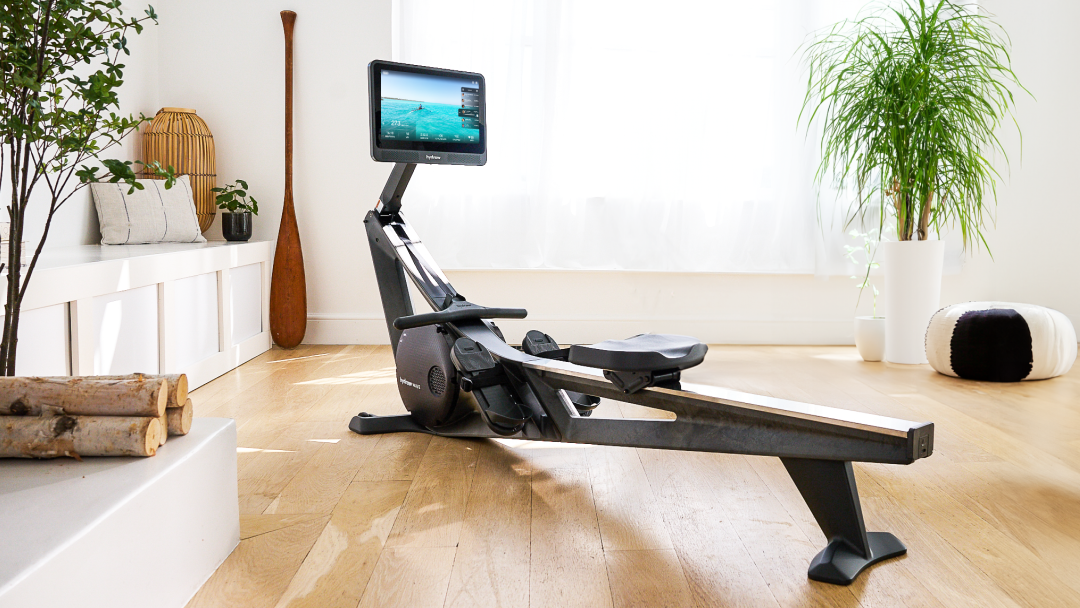
Explore Hydrow
Learn more about how you can transform your fitness routine with a rowing machine.

